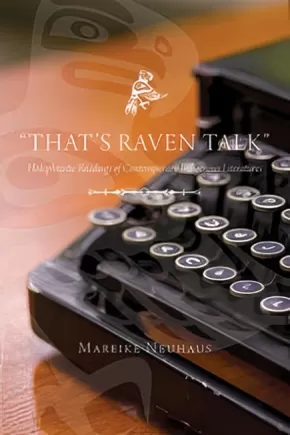Mareike Neuhaus
Mareike Neuhaus, author of That's Raven Talk and The Decolonizing Poetics of Indigenous Literatures, is an independent scholar specializing in North American Indigenous literature and Canadian literature.
Books (1)
Synopsis:
“That’s Raven Talk”: Holophrastic Readings of Contemporary Indigenous Literatures is the first comprehensive study of North American Indigenous languages as the basis of textualized orality in Indigenous literatures in English. Drawing on a significant Indigenous language structure—the holophrase (one-word sentence)— Neuhaus proposes “holophrastic reading” as a culturally specific reading strategy for orality in Indigenous writing. In readings of works by Ishmael Alunik (Inuvialuit), Alootook Ipellie (Inuit), Richard Van Camp (Dogrib), Thomas King (Cherokee), and Louise Bernice Halfe (Cree), she demonstrates that (para)holophrases—the various transformations of holophrases into English-language discourse—textualize orality in Indigenous literatures by grounding it in Indigenous linguistic traditions. Neuhaus’s discussion points to the paraholophrase, the functional equivalent of the holophrase, as a central discourse device in Indigenous writing and as a figure of speech in its own right. Building on interdisciplinary research, this groundbreaking study not only links oral strategies in Indigenous writing to Indigenous rhetorical sovereignty, but also points to ancestral language influences and Indigenous rhetoric more generally as areas for future research.
Additional Information
336 pages | 6.00" x 9.00"| Paperback






